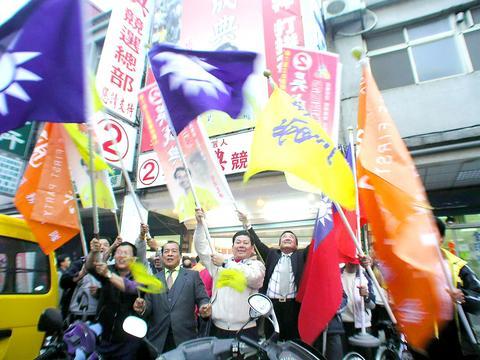The political geography was little changed yesterday as the Democratic Progressive Party (DPP) and its ally, the Taiwan Solidarity Union (TSU), failed to boost their local standings.
Taipei City residents did not enthusiastically take part in the election. Statistics showed only 61 per-cent of voters cast ballots.

PHOTO: WU CHENG-TING, TAIPEI TIMES
In northern Taipei City, or district one, the pan-green camp and the pan-blue camp split the 10 seats down the middle. But the district was the only place the DPP's ballot-allocation strategy worked.
In district two, the pan-blue camp of the Chinese Nationalist Party (KMT), the People First Party (PFP) and New Party, retained their strong influence.
The KMT and the DPP each won three seats, the PFP took two and the TSU won one. Independent Li Ao (
The KMT's Lai Shyh-bao (
In Taipei County, the DPP held onto its 11 seats but its ally didn't fare as well. The TSU lost one of the two seats it had gained in 2001 election. The pan-blue camp added three more seats to the 13 it won in 2001 for a total of 16. KMT candidate Wu Yu-sheng (
Although President Chen Shui-bian (
In Taichung City, the pan-green and the pan-blues evenly split the eight seats being contested.
In Yunlin County, the pan-greens gained some ground, although the election was affected by the arrest of former county commissioner Chang Jung-wei (
The pan-greens added one seat to the two they won in the country in 2001 with the victory of TSU councilwoman Yin Lin-in (
In Chiayi County, the DPP safeguarded its three seats by taking 63 percent of the vote, while a KMT candidate won the other seat.
In Tainan County, home not only to President Chen but fanatic pan-green supporters, the DPP held onto its five seats by taking al-most half the votes. The KMT won two seats and an independent candidate took the remaining seat.
In Tainan City, the pan-green camp lost one of the four seats won in 2001 as the TSU's candidate lost. The KMT won two seats and a PFP candidate won one.
In the two electoral districts of Kaohsiung City, the pan-greens gained about 53 percent of the vote, a significantly improvement over the 48 percent won in 2001.
The DPP's Lee Kun-tse (
But the pan-green's vote-allocation strategy didn't work in the southern dis-trict, where they lost one seat. The greens won seven seats, the KMT took two and the PFP won two.
In Pingtung County, the DPP lost one of its four seats. The KMT won two seats and and an independent candidate took one.
In eastern Taiwan, the pan-blues continued their tradition of strong showings. In Taitung County, KMT Legislator Huang Chien-ting (
In Hualien County, DPP Legislator Lu Po-chi (
In offshore counties, independents and other candidates did well. Penghu County's sole seat was won by Lin Ping-kun (
Four Aboriginal candidates were elected in plains townships. The DPP's Chen Ying (

Taiwan is stepping up plans to create self-sufficient supply chains for combat drones and increase foreign orders from the US to counter China’s numerical superiority, a defense official said on Saturday. Commenting on condition of anonymity, the official said the nation’s armed forces are in agreement with US Admiral Samuel Paparo’s assessment that Taiwan’s military must be prepared to turn the nation’s waters into a “hellscape” for the Chinese People’s Liberation Army (PLA). Paparo, the commander of the US Indo-Pacific Command, reiterated the concept during a Congressional hearing in Washington on Wednesday. He first coined the term in a security conference last

Prosecutors today declined to say who was questioned regarding alleged forgery on petitions to recall Democratic Progressive Party (DPP) legislators, after Chinese-language media earlier reported that members of the Chinese Nationalist Party (KMT) Youth League were brought in for questioning. The Ministry of Justice Investigation Bureau confirmed that two people had been questioned, but did not disclose any further information about the ongoing investigation. KMT Youth League members Lee Hsiao-liang (李孝亮) and Liu Szu-yin (劉思吟) — who are leading the effort to recall DPP caucus chief executive Rosalia Wu (吳思瑤) and Legislator Wu Pei-yi (吳沛憶) — both posted on Facebook saying: “I

Sung Chien-liang (宋建樑), who led efforts to recall Democratic Progressive Party (DPP) Legislator Lee Kun-cheng (李坤城), was released on bail of NT$80,000 today amid outcry over his decision to wear a Nazi armband to questioning the night before. Sung arrived at the New Taipei District Prosecutors’ Office for questioning in a recall petition forgery case last night wearing a red armband bearing a swastika, carrying a copy of Adolf Hitler’s Mein Kampf and giving a Nazi salute. Sung left the building at 1:15am without the armband and covering the book with his coat. Lee said today that this is a serious

A mountain blaze that broke out yesterday morning in Yangmingshan National Park was put out after five hours, following multi agency efforts involving dozens of fire trucks and helicopter water drops. The fire might have been sparked by an air quality sensor operated by the National Center for High-Performance Computing, one of the national-level laboratories under the National Applied Research Laboratories, Yangmingshan National Park Headquarters said. The Taipei City Fire Department said the fire, which broke out at about 11am yesterday near the mountainous Xiaoyoukeng (小油坑) Recreation Area was extinguished at 4:32pm. It had initially dispatched 72 personnel in four command vehicles, 16